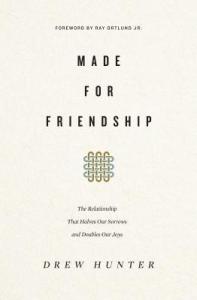 Drew Hunter published Made for Friendship: the Relationships that Halve Our Sorrows and Double our Joys through Crossway in 2018. Hunter insists on “raising our esteem for friendship” (14), and he succeeds by enhancing our conception of it. Distinguishing his view from the normal usage of “friendship,” Hunter goes so far as to define salvation as friendship with god (23) and to exclaim that “friendship is the ultimate end of our existence and our highest source of happiness” (19). No small part of our lives, then.
Drew Hunter published Made for Friendship: the Relationships that Halve Our Sorrows and Double our Joys through Crossway in 2018. Hunter insists on “raising our esteem for friendship” (14), and he succeeds by enhancing our conception of it. Distinguishing his view from the normal usage of “friendship,” Hunter goes so far as to define salvation as friendship with god (23) and to exclaim that “friendship is the ultimate end of our existence and our highest source of happiness” (19). No small part of our lives, then.
Hunter does well establishing friendship as an essential feature of our world, noting that god had to fill a lack in the prelapsarian cosmos when he created the woman, because it was “not good” for the man to be alone (41). This was certainly the most interesting argument of the book, as far as I’m concerned–and one which I will pursue further in my own studies; it suggests something a bit strange about god’s creative process, which, if true, means we’ve ignored important parts of the creation narrative.
Another interesting facet of the book is Hunter’s appropriation of Vanhoozer’s argument (123) that the Trinity created all things in order to further perfect its already perfect communion; the entrance of men and women into the perichoretic friendship of the godhead does not detract from the essential perfection of the godhead but adds to it. Again, if this is the case, it suggests a few things about divine simplicity and the nature of god.
These somewhat abstract concerns aside, Hunter offers a variety of solid reasons for embracing friendship and seeking out opportunities to grow in our ability to befriend. (Hunter disavows friendliness as mere courtesy, a point well-taken.) Friendship enhances our own lives and the lives of those around us, and we do well to become better friends.
At its core, Made for Friendship is pastoral. Hunter wants his readers to become more like the people god created them to be, particularly insofar as their “friendship” with Jesus is concerned. At times, especially toward the end as Hunter explicitly addresses friendship with god, the book felt trite. This is a shame, because to be called a “friend of god” is a high honor (Is. 41.8) and marks a kind of restoration of the Edenic communion (cf. Gen. 3.8, in its anticipation of the forthcoming break in fellowship).
Nevertheless, Made for Friendship succeeds where Hunter seeks to promote friendship as the particularization of that broad idea of “community.” He offers winsome and practical exhortations for those that desire to increase their aptitude for friendship. In that respect, Made for Friendship is worth the read.
I received a complimentary edition of this work from Crossway in exchange for an honest review.
